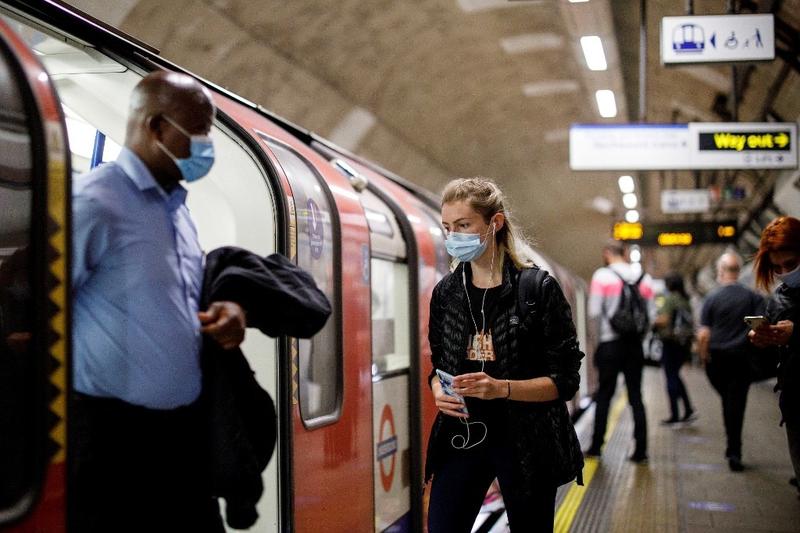 In this June 15, 2020 photo, commuters wearing a face mask travel on TfL Victoria Line underground train carriages, heading towards central London. (TOLGA AKMEN / AFP)
In this June 15, 2020 photo, commuters wearing a face mask travel on TfL Victoria Line underground train carriages, heading towards central London. (TOLGA AKMEN / AFP)
As the United Kingdom gears up to overhaul its immigration system, the country's plan to end freedom of movement for millions of European Union citizens within its borders is already hurting both sides, analysts said.
For the UK, ending the free flow of workers between it and the EU will hurt certain sectors of the economy - such as public health, agriculture and construction - that employ many EU laborers
British Home Secretary Priti Patel on Monday unveiled a document outlining the new immigration rules after the country completes its departure from the EU. At their core is a points-based system for deciding who will be allowed to stay in the UK.
Under the changes, which will come into effect from Jan 1, citizens of the EU's 27 member countries will be treated equally to arrivals from the rest of the world. But it allows those already living in Britain, and those yet to arrive before Dec 31, to apply to settle in Britain under an EU settlement scheme. Applications must be in by June 30.More than 3.7 million EU citizens have already applied.
The EU applicants applying to work in Britain will also need sufficient English-language skills to aid their integration into British communities.
ALSO READ: UK tells businesses to prepare for Brexit crunch
"The British people voted to take back control of our borders and introduce a new points-based immigration system," Patel said.
"Now we have left the EU, we are free to unleash this country's full potential and implement the changes we need to restore trust in the immigration system and deliver a new fairer, firmer, skills-led system from Jan 1, 2021."
Jon Geldart, director-general of the United Kingdom Institute of Directors, which represents over 25,000 business leaders in the UK, said that even the mere discussion of the news rules is already affecting British businesses.
"For some time since Brexit was voted on by the British public there have been concerns that the end to free movement would result in Britain seeming like it is not a welcoming place for talented employees," he said. "This is not the message the British industry wishes to send to the world."
Difficulties for choices
He said that the government will need to ensure that work visas can be granted quickly for the talent that Britain needs to rebuild its economy after the COVID-19 pandemic.
Claudia Vernotti, director of ChinaEU, a business-led association in Brussels, Belgium, said that the incoming policy probably won't have profound effects on Europeans who don't live, study, or work in the UK.But for many others, it could suggest difficulties for future choices.
"It may deter some people's decision to move to the UK or make them adopt a more cautious attitude toward programming education, seeking a job or selecting business partners in the UK," she said.
He Yun, an assistant professor in the School of Public Administration at Hunan University, said that migration is already a divisive issue in many European countries. Brexit could intensify the debate on the free flow of labor within the EU and potentially cause further challenges for European integration.
The points-based immigration system will make it difficult for low-skilled EU workers, in particular, to enter the UK as they will not be able to reach a designated salary threshold required to apply for work visas, she said.
"This problem is particularly acute for many Eastern European workers working in agriculture, care homes, and construction in the UK," He said. "They will have to look for jobs elsewhere, for instance, in more developed economies within the EU, such as Germany and France."
READ MORE: Brexit talks end early as EU, UK say major hurdles remain
For the UK, ending the free flow of workers between it and the EU will hurt certain sectors of the economy - such as public health, agriculture and construction - that employ many EU laborers.
"The UK government has already promised to give European doctors and nurses fast-track visas, but how well and quickly the system will be implemented and whether it will cause any disruption are unknown," she said.
She said that due to the pandemic, businesses from both sides will not have enough time to plan for what is to come after the transition period ends. Given this backdrop, the end of the free flow of people between the EU and the UK in less than six months could cause major disruptions, He said.
Xinhua contributed to this story.


